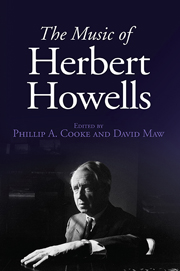Book contents
- Frontmatter
- Dedication
- Contents
- List of Illustrations
- List of Musical Examples
- List of Tables
- List of Contributors
- Foreword
- Acknowledgements
- Miscellaneous Frontmatter
- Introduction: Paradox of an Establishment Composer
- PART I Howells the Stylist
- PART II Howells the Vocal Composer
- 4 ‘Hidden Artifice’: Howells as Song-Writer
- 5 A ‘Wholly New Chapter’ in Service Music: Collegium regale and the Gloucester Service
- 6 Howells's Use of the Melisma: Word Setting in His Songs and Choral Music
- PART III Howells the Instrumental Composer
- PART IV Howells the Modern
- PART V Howells in Mourning
- Appendix: Catalogue of the Works of Herbert Howells
- Bibliography
- Index of Works
- General Index
5 - A ‘Wholly New Chapter’ in Service Music: Collegium regale and the Gloucester Service
from PART II - Howells the Vocal Composer
Published online by Cambridge University Press: 05 December 2013
- Frontmatter
- Dedication
- Contents
- List of Illustrations
- List of Musical Examples
- List of Tables
- List of Contributors
- Foreword
- Acknowledgements
- Miscellaneous Frontmatter
- Introduction: Paradox of an Establishment Composer
- PART I Howells the Stylist
- PART II Howells the Vocal Composer
- 4 ‘Hidden Artifice’: Howells as Song-Writer
- 5 A ‘Wholly New Chapter’ in Service Music: Collegium regale and the Gloucester Service
- 6 Howells's Use of the Melisma: Word Setting in His Songs and Choral Music
- PART III Howells the Instrumental Composer
- PART IV Howells the Modern
- PART V Howells in Mourning
- Appendix: Catalogue of the Works of Herbert Howells
- Bibliography
- Index of Works
- General Index
Summary
If I made the setting of the Magnificat, the mighty should be put down from their seat without a brute force that would deny this canticle's feminine association. Equally, that in the Nunc dimittis, the tenor's domination should characterise the gentle Simeon. Only the ‘Gloria’ should raise its voice.
These words were written by the composer in 1967 as the sleeve note for a recording of Herbert Howells' Church Music that was released on the Argo record label. As well as providing useful information to the listener, it also acts as a blueprint for Howells's aesthetic when composing music for the evening service, the largest and most performed part of his oeuvre. This quotation not only sets out Howells's compositional agenda but also suggests that the composer felt there were deficiencies in the extant settings that could no doubt be remedied by his unique and idiosyncratic compositional voice. This blueprint would apply to the vast majority of Howells's mature settings (1945–75) and is especially pertinent in the two most celebrated settings: Collegium regale (HH 246 – 1945) and the Gloucester Service (HH 249–1946). The word ‘revolution’ may be a touch strong for the changes made to the music for evening worship under Howells's aegis, but there are certainly some striking but subtle developments that Howells brought to these canticles.
- Type
- Chapter
- Information
- The Music of Herbert Howells , pp. 86 - 99Publisher: Boydell & BrewerPrint publication year: 2013



